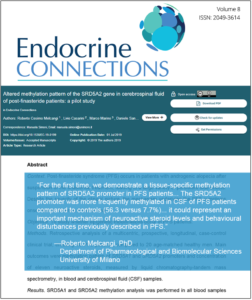July 20, 2019
Dear Friends:
Phase III of the PFS Foundation-sponsored research at the University of Milano (UniMi), which was designed to “study whether epigenetic modifications occur in PFS patients,” has successfully demonstrated epigenetic modifications in PFS patients.
Titled Altered methylation pattern of the SRD5A2 gene in cerebrospinal fluid of post-Finasteride patients, the pilot study was published this month in the online edition of Endocrine Connections.
 Roberto Cosimo Melcangi, Ph.D. at UniMi’s Department of Pharmacological and Biomolecular Sciences, led a team of 10 researchers from six institutions who performed methylation analysis in blood samples of 16 PFS patients and 20 healthy control-group patients, and in cerebrospinal fluid (CSF) samples of 16 PFS patients and 13 controls.
Roberto Cosimo Melcangi, Ph.D. at UniMi’s Department of Pharmacological and Biomolecular Sciences, led a team of 10 researchers from six institutions who performed methylation analysis in blood samples of 16 PFS patients and 20 healthy control-group patients, and in cerebrospinal fluid (CSF) samples of 16 PFS patients and 13 controls.
“For the first time, we demonstrate a tissue-specific methylation pattern of SRD5A2 promoter in PFS patients,” writes Prof. Melcangi. He concludes that methylation of the SRD5A2 promoter in PFS patients “could represent an important mechanism of neuroactive steroid levels and behavioral disturbances previously described in PFS.”
The SRD5A2 gene provides instructions for making steroid 5-alpha reductase, type 2, the enzyme that is inhibited by finasteride (Propecia and Proscar). This enzyme is involved in the processing of androgens and multiple other steroid hormones. Specifically, the enzyme converts testosterone into the more potent androgen, dihydrotestosterone (DHT), and multiple other steroid hormones into neuroactive steroids. DHT is essential for the normal development and maintenance of male sex characteristics, and normal function of the sexual organs. Neuroactive steroids are critically important for normal brain and central nervous system function.
The most notable findings of Prof. Melcangi’s study is that “The SRD5A2 promoter was more frequently methylated in the CSF of PFS patients compared to controls (56.3 versus 7.7%).”
The UniMi team explains that methylation of the SRD5A2 promoter could cause some of the persistent side effects in PFS patients. DNA methylation is an epigenetic mechanism that is important for controlling gene expression. Methylation of the promoter of a gene reduces or silences expression of the gene.
Publication of this pilot study marks the completion of Phase III of Prof. Melcangi’s ongoing investigation into PFS. The study was aimed at determining the root causes of the condition, a necessary first step in the identification of a molecular target that might possibly be a focus in the development of future drug therapies.
Phase II of Prof. Melcangi’s research was published in the January issue of Psychoneuroendocrinology. Titled Treatment of male rats with finasteride, an inhibitor of 5alpha-reductase enzyme, induces long-lasting effects on depressive-like behavior, hippocampal neurogenesis, neuroinflammation and gut microbiota composition, the animal-model study demonstrated that “Finasteride treatment causes several alterations in the hippocampus,” the section of the brain responsible for processing long-term memory and emotional responses.
Phase I of the investigation, published in the July 2017 edition of The Journal of Steroid Biochemistry and Molecular Biology and titled Neuroactive Steroid Levels and Psychiatric and Andrological Features in Post-Finasteride Patients, demonstrated that PFS patients suffer from altered levels of critical brain-function regulators, including neuroactive steroids.
 That three-year study, in which 16 men with PFS and 25 control patients were evaluated, also uncovered evidence of neuropathy of the pudendal nerve among those with severe erectile dysfunction.
That three-year study, in which 16 men with PFS and 25 control patients were evaluated, also uncovered evidence of neuropathy of the pudendal nerve among those with severe erectile dysfunction.
Anyone living in the US who suffers from PFS should report his symptoms to the US Food and Drug Administration. Anyone living outside the US who suffers from PFS should report his symptoms to the US Food and Drug Administration as well as to his national drug-regulatory agency, as directed on our Report Your Side Effects page.
Finally, if you or a loved one are suffering from PFS, and feeling depressed or unstable, please don’t hesitate to contact the PFS Foundation as soon as possible via our Patient Support hotline: social@pfsfoundation.org
Thank you.
Related News
